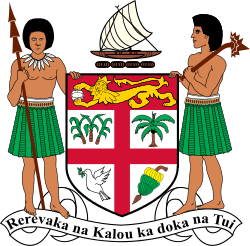Nadi Rural (Indian Communal Constituency, Fiji)
Nadi Rural Indian Communal is a former electoral division of Fiji, one of 19 communal constituencies reserved for Indo-Fijians. Established by the 1997 Constitution, it came into being in 1999 and was used for the parliamentary elections of 1999, 2001, and 2006. (Of the remaining 52 seats, 27 were reserved for other ethnic communities and 25, called Open Constituencies, were elected by universal suffrage). The electorate covered the rural hinterland of the City of Nadi in the western part of the main island of Viti Levu.
 |
|---|
| This article is part of a series on the politics and government of Fiji |
|
Legislative
|
|
Judiciary
|
|
The 2013 Constitution promulgated by the Military-backed interim government abolished all constituencies and established a form of proportional representation, with the entire country voting as a single electorate.
Election results
In the following tables, the primary vote refers to first-preference votes cast. The final vote refers to the final tally after votes for low-polling candidates have been progressively redistributed to other candidates according to pre-arranged electoral agreements (see electoral fusion), which may be customized by the voters (see instant run-off voting).
1999
| Candidate | Political party | Votes | % |
| Shiu Sharan Sharma | Fiji Labour Party (FLP) | 5,395 | 66.09 |
| Dewendra Pratap | National Federation Party (NFP) | 2,768 | 33.91 |
| Total | 8,163 | 100.00 | |
2001
| Candidate | Political party | Votes | % |
| Gunasagaran Gounder | Fiji Labour Party (FLP) | 5,351 | 68.79 |
| Surendra Kumar | National Federation Party (NFP) | 2,295 | 29.50 |
| Ram Vinod | New Labour Unity Party (NLUP) | 133 | 1.71 |
| Total | 7,779 | 100.00 | |
2006
| Candidate | Political party | Votes | % |
| Perumal Mupnar | Fiji Labour Party (FLP) | 6,825 | 71.91 |
| Kama Waddi Raju | National Federation Party (NFP) | 2,528 | 26.64 |
| Armogam Sami | Soqosoqo Duavata ni Lewenivanua (SDL) | 138 | 1.45 |
| Total | 9,491 | 100.00 | |